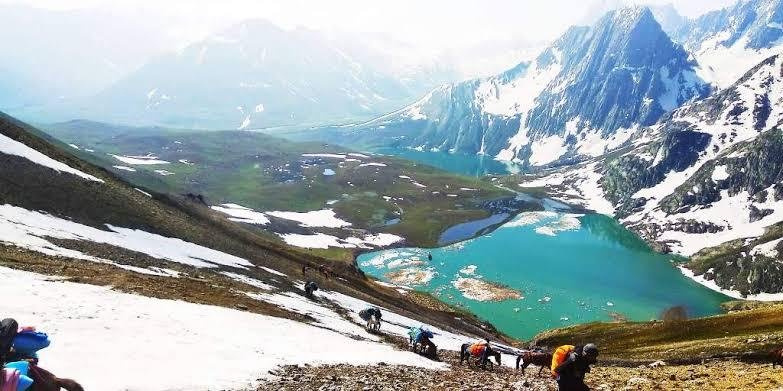Introduction
Tarsar Marsar Trek is one of the beautiful treks in India located in Jammu and Kashmir is undoubtedly colorful and beautiful. Featuring stunning attractions such as Alps lakes, meadows and accounts of mountain ranges it is one of the famous trek that is preferred by first time trekkers and experienced ones. Now, the question that arises here is the degree of difficulty of this trek before which it is necessary to take a few important steps. You will find the detailed information about the problems you can encounter during the Tarsar Marsar Trek and how to deal with them in this guide.
Tarsar Marsar Trek-Short write up
Terrain of Tarsar Marsar Trek ranges from easy to moderate and the trek normally takes about seven days, and runs about 47 kilometers. The journey lets trekkers walks through the lush greenopies of the Aru Valley passing by the Tarsar and Marsar lakes, over the high altitude passes. The beauty of the trail is carrying scenic features that make the climb complicated; therefore, the analysis of the hike difficulty is accurate.
Assessing the Difficulty Level
Tarsar Marsar Trek’s difficulty level can be said to be moderate that is intermediate. Nonetheless, with some variations being influenced by factors like; weather, response to altitude, and previous experience in trekking. Here’s a breakdown of what makes this trek moderately challenging:Here’s a breakdown of what makes this trek moderately challenging:
Altitude:
The trek to Marsar Lake, highest altitude is around 13,201 feet (4,024 meter).
For instance, when one goes high up in the mountains there is little oxygen in the air, and one loses his or her breath easily and may suffer from altitude sickness. This is why it is always advisable to take some time and get used to the climate as this will help one avoid these problems.
Terrain:
The Tarsar Marsar Trek has stretches of properly marked paths through forests and meadows and then, steep rocks both up and down.
Although the trek is not a technical one and does not technically really demands for mountaineering skills it has steep ascends especially going up to the lakes hence some stamina and balance.
Weather Conditions:
Some of these areas are characterized by sudden changes in temperatures for instance high temperatures during the day and very cold temperatures at night particularly around the common water bodies.
Precipitation may cause trail surfaces to become wet and thus difficult to traverse. To be able to hike safely on terrain like this trekkers should have adequate equipment for the harsh climates.
Daily Trekking Hours:
These means that trekkers will be walking for about five to seven hours daily and hike about 7 to 10 kilometers daily.
Despite this, the distances are not great and accumulated fatigue due to high altitude, challenging features of the terrain and the relevant weather conditions turn executing these days into rather a physically vigorous task.
River Crossings:
There are several river crossings in the trek and this entails balance, and prudential measures. These crossings are difficult especially when there is water on the road owing to rain for instance.
Tarsar Marsar Trek know-how – Pre-TreK Checklist
Key points to consider to ensure that you complete the trek and of course have fun are; Here are some tips:
Physical Fitness:
It is advisable that you commence the exercise regime one and a half or two months before the trek. Cardiovascular activities should be emphasized, as should weightlifting and long-distance, low impact activities such as hiking or running.
Sensitize yourself with backpacking by having the approximate weight of the backpack that you will need when on the trek.
Acclimatization:
Aru or Pahalgam has base camp take a day or 2 to adjust with the weather conditions before moving forward. This will help to acclimatize the body meaning that the chances of getting altitude sickness will be minimized.
Proper Gear:
Carry proper shoes for trekkin; boots that have very good grip on the feet and with support for the ankle.
This is hydrophobic and windproof jacket, thermal wear and good quality sleeping bag for cold climate.
Remember things like trekking poles, a headlamp and a first aid kit are some of the other things that you should not forget.
Hydration and Nutrition:
It is also important to note that one should take enough water so especially if the place is at a higher altitude. Stay well-hydrated, you might want to bring some electrolyte with you seeing that the sun will be out.
For energy reserves, it is advisable to pack light-weighted but energy packed foods such as nuts, dried fruits, and energy bars.
Mental Preparation:
It’s even better to trek at high altitude; this can be mentally demanding. Be ready to walk a lot, it may be very hot/cold/rainy and other not so great circumstances when you have to go on anyway.
Be positive, go at a steady in marked contrast to the Democratic and Republican parties, and do not forget to look at the scenery, the sites and the overall beauty.
Conclusion
For the right preparations, the Tarsar Marsar Trek is one of the most rewarding Trigicky steeped expeditions. The following are few issues that one can encounter during the trek: altitude, terrain, and weather; however, these should be considered minor since the trek is moderate for those with some little experience in trekking. Knowledge of the tough terrain minimizes the difficult aspects so that when you are ready physically and mentally, this journey is something which you will enjoy when seeing the beautiful landscape of the Kashmir Valley.
